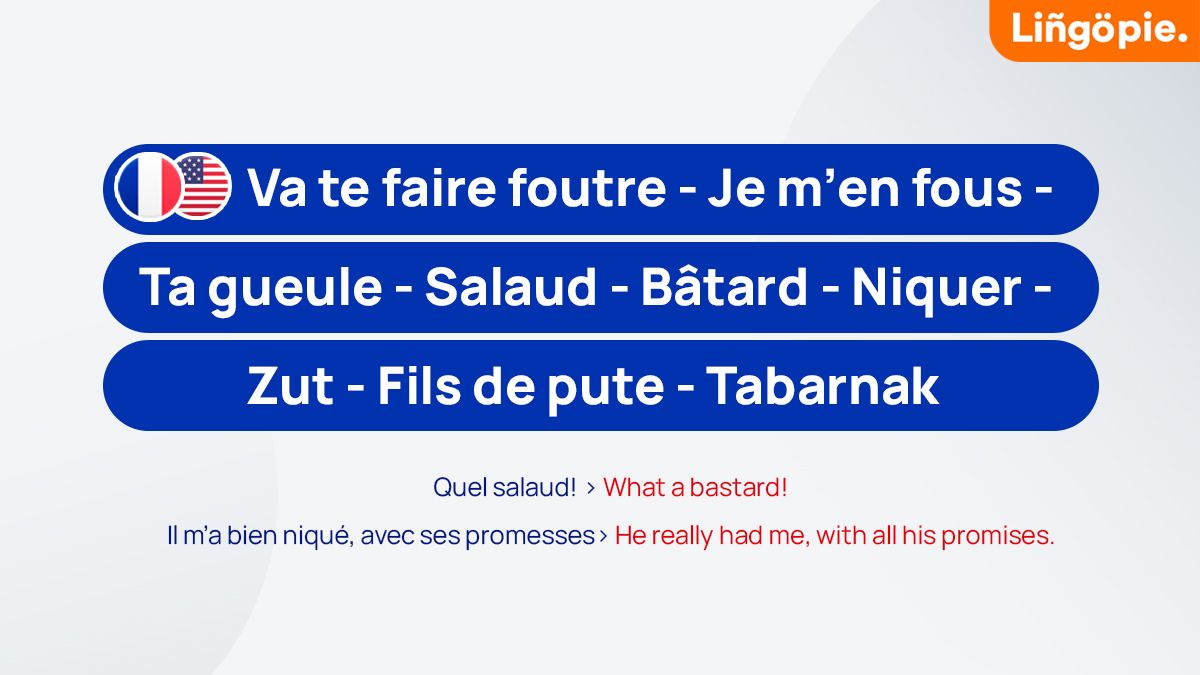Ever wondered how the French express their frustration or excitement? If you're diving into the world of French swear words, you're about to unlock a treasure trove of linguistic power. Whether you're planning a trip to Paris, binge-watching French movies, or simply curious about how people let off steam in another language, this guide's got you covered. But hey, tread carefully—some of these words might get you into trouble if used in the wrong context!
Swearing is universal, but each language has its own flair. In French, curse words carry a certain je ne sais quoi that can make even the harshest insult sound poetic. But don't get carried away—understanding when and where to use them is key. We'll explore everything from mild expressions to full-blown expletives, along with cultural nuances that'll keep you from offending anyone accidentally.
So, grab a café au lait, sit back, and let's dive into the art of French swearing. This guide isn't just about words; it's about understanding the culture, context, and the occasional humor behind these expressions. Ready? Let's get started!
Read also:Anthony Head And Sarah Fisher A Tale Of Love Talent And Legacy
Table of Contents
- Introduction to French Swear Words
- The History Behind French Cursing
- Basic French Swear Words
- Understanding Cultural Context
- Common French Swear Phrases
- Can Swearing Be Polite?
- Long-Tail French Swear Words
- Swearing in French Media
- Taboos and Sensitivities
- Tips for Learning French Swear Words
- Conclusion: To Swear or Not to Swear?
Introduction to French Swear Words
Let's face it—swearing is part of human nature. It's an emotional release, a way to vent frustration, or even a tool for humor. But when it comes to French, the rules are slightly different. French swear words, or "jurons," have a rich history and a unique place in the language. They're not just random exclamations; they're deeply rooted in culture and context.
Why Learn French Swear Words?
Learning how to say swear words in French isn't just about expanding your vocabulary. It's about understanding the nuances of the language and the people who speak it. Whether you're traveling, working, or simply conversing with a French speaker, knowing the right words—and when to use them—can make all the difference.
The History Behind French Cursing
French swearing has evolved over centuries, influenced by religion, politics, and societal norms. Back in the day, religious insults were the norm. Words like "sacré" and "mon Dieu" were common, reflecting the strong Catholic roots of France. Over time, however, the language of swearing has shifted, incorporating more secular expressions.
Today, French swear words are a mix of old-school religious terms and modern, edgy slang. This blend gives French cursing a unique flavor that's both historical and contemporary.
Basic French Swear Words
Ready to get your feet wet? Here are some basic French swear words to get you started:
- Merde: Probably the most famous French swear word, meaning "shit." Use it sparingly—it's strong!
- Zut: A milder exclamation, similar to "darn" or "oops."
- Foutu: Roughly translates to "fucked" or "damned," depending on the context.
- Salaud: A harsh insult, often used to call someone a "bastard" or "jerk."
When to Use Them
Context is everything. While "merde" might be acceptable in informal settings, "salaud" could land you in hot water if used incorrectly. Always consider who you're speaking to and the situation you're in.
Read also:Who Married Marilyn Manson The Untold Story Behind The Headlines
Understanding Cultural Context
Swearing in French isn't just about the words—it's about the culture behind them. In France, cursing is more accepted in casual settings than in formal ones. However, excessive swearing can still be seen as rude or immature.
French people often use swear words with humor or as a form of emphasis, rather than pure aggression. This playful approach can make swearing feel less intense than in other languages.
Common French Swear Phrases
Now that you've got the basics down, let's move on to some common French swear phrases:
- Putain de merde: A stronger version of "merde," roughly translating to "fuck shit." Be careful with this one—it's pretty intense.
- C'est de la merde: Literally "it's shit," used to describe something of poor quality.
- Je m'en fous: Means "I don't care" or "I don't give a damn." A versatile phrase for dismissing something.
Using Phrases in Context
Phrases like "putain de merde" are best reserved for private conversations or among close friends. Public displays of swearing, especially in formal settings, are generally frowned upon.
Can Swearing Be Polite?
Believe it or not, there are ways to swear in French without offending anyone. Words like "zut" or "mince" are considered polite curses, perfect for expressing mild frustration without raising eyebrows.
Even "merde" can be softened depending on the tone and context. For example, saying "merde" to wish someone good luck before a performance is a tradition in French theater.
Long-Tail French Swear Words
For those who want to dive deeper, here are some long-tail French swear words:
- Bordel de merde: A supercharged version of "merde," often used to express extreme frustration.
- Connard: A harsh insult, roughly meaning "idiot" or "asshole." Use with caution.
- Enculé: One of the strongest French swear words, often considered vulgar and offensive.
When to Avoid These Words
Long-tail swear words are best left out of polite conversation. Reserve them for private moments or when you're absolutely sure the context allows it.
Swearing in French Media
French media, from films to TV shows, often features swearing as a way to reflect real-life conversations. Movies like "Taxi" or "Les Tuches" use curse words to add humor and authenticity.
However, French TV networks are more regulated, especially during daytime programming. Swearing is usually bleeped out or toned down to avoid offending viewers.
Taboos and Sensitivities
While French people are generally more open about swearing, certain topics remain taboo. Religious insults, for example, can still offend some people, especially in predominantly Catholic regions.
It's also important to be mindful of political or social sensitivities. Words related to race, gender, or sexuality should be avoided unless you're absolutely sure of the context.
Tips for Learning French Swear Words
Learning to swear in French takes practice and understanding. Here are a few tips to help you master the art:
- Start with the basics: Begin with mild words like "zut" or "mince" before moving on to stronger expressions.
- Practice with native speakers: Engage in conversations with French speakers to get a feel for when and how to use these words.
- Watch French media: Movies, TV shows, and even YouTube videos can provide valuable insights into how swearing is used in real life.
Common Mistakes to Avoid
One of the biggest mistakes is using swear words too casually or in the wrong context. Always pay attention to the tone and body language of the people around you.
Conclusion: To Swear or Not to Swear?
Learning how to say swear words in French can be both fun and educational. It opens up a new world of expression and helps you connect with French speakers on a deeper level. However, it's crucial to use these words responsibly and with respect for cultural norms.
So, the next time you're in France or chatting with a French friend, don't be afraid to let loose a little. Just remember—swearing is like spice: a little goes a long way!
Got any questions or stories about French swearing? Drop a comment below or share this article with your friends. And hey, if you're craving more linguistic adventures, check out our other guides. À bientôt!



